Almost There: Bette Davis in "Of Human Bondage"
 Monday, March 2, 2020 at 9:30AM
Monday, March 2, 2020 at 9:30AM 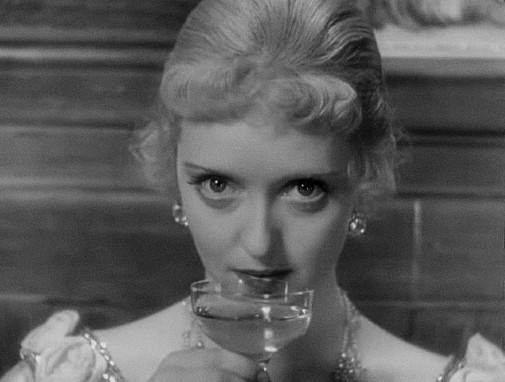
Nowadays, Oscar snubs generate justifiable fire on social media and occassionally even get primetime attention. However, they're not huge stories that threaten the existence and validity of the Academy itself. It wasn't always like this. Back in the early days of the Oscars, some snubs were so outrageous they made fear blossom in the hearts of Academy members, threatening to invalidate the entire (new) institution in the eyes of the general public. So much so, that new rules were put in place to avoid similar outcomes, write-in votes were allowed and apologies were handed out in the shape of what we now call a career Oscar.
Such was the case in the mid-30s when Bette Davis made Of Human Bondage, defied Hollywood's expectations, became a sudden star and still failed to get the Academy Award nomination most thought she deserved…
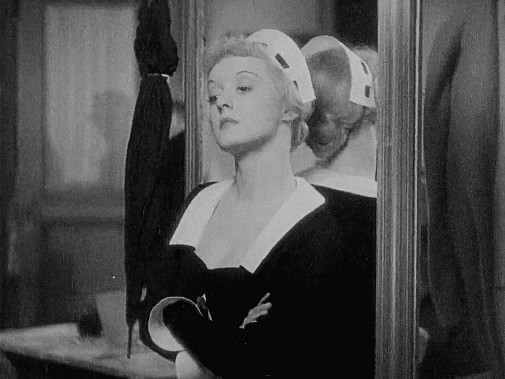
Following years of being thoroughly wasted by Warner Bros, young Bette needed a challenge. She was also after a project that would allow her to climb the Hollywood totem pole. Luckily for Ms. Davis, there was a role that represented an acting challenge like few others. Even luckier was the fact most of Hollywood's bigger names had already passed on the screenplay, feeling the character was too shrill and nasty. They feared such a dark turn could spoil their relationship with the public, but that wasn't a problem for Bette Davis. After all, she was never better than when playing against the audience's sympathies.
After imploring Jack Warner to let her work with another studio, Davis got the role of Mildred Rogers in RKO's adaptation of W. Somerset Maugham's seminal novel - Of Human Bondage. This feat of studio somersaulting would end up contributing to her Oscar snub, but Davis knew what she was doing. Cajoling director John Cromwell, she managed to get creative control over her character's demeanor and look. In a move of gargantuan risk at the time, Davis even insisted on doing her makeup, marring her beauty with smudged eyeliner and sweaty foundation. Throughout the film, she often looked a fright, but the more the audience hated or were disgusted by Mildred, the more they loved Bette Davis.
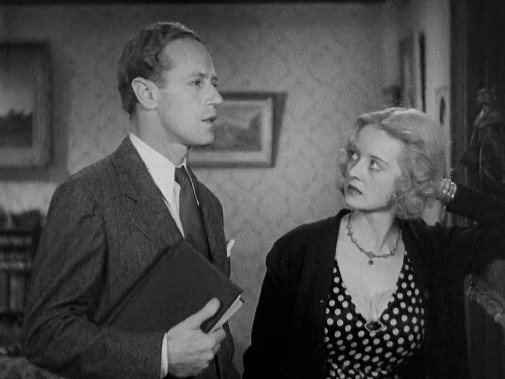
Still, no matter the showiness of the part, Of Human Bondage isn't really the story of Mildred Rogers. The film is about a clubfooted medical student by the name of Philip Carey. He's an Englishman of mediocre talent, a young fellow who abandoned dreams of being a painter to follow the vocation of medicine. With aspirations of higher social clout and wealth, this is a sorry excuse for a romantic hero, no matter how tragic his story may be. This being the 1930s we're still supposed to feel sympathy for him, especially when contrasted with the destructive presence of his beloved harpy who oozes disdain from the moment Philip first lays eyes on her.
With a sneer and the arrogant posture of a much wealthier woman, Davis' penniless waitress is a sight to behold. She's so magnetic that we still pay her attention when Mildred snubs the camera and turns her back to the audience. It's an obstinate entrance for a most obstinate character and things are only starting. As the film progresses, Mildred sheds the off-putting coldness of her first scene and lets us see the many layers of moral rot that make up her soul. In sparse interludes, Davis' shiny eyes paint a picture of beatific innocence that's immediately contradicted by a sly line reading. Then we have her seduction scenes, full of sexual energy and the voracious hunger of a master predator playing with its food. It's riveting work, even if it's not very subtle.
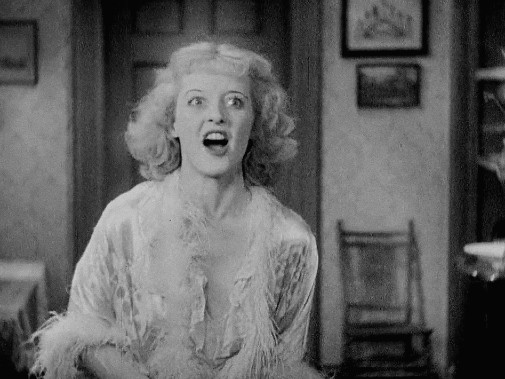
Bette Davis was as an actress willing to take risks, a consummate performer always ready to bring sound and fury to any role. Her Mildred is no different, but she's lacking some fine-tuning. For starters, Davis' Cockney accent is a nightmare of inconsistencies, sometimes wavering in intensity in a single line. She also has a propensity for mugging and biting huge chunks of scenery whenever the film gives her the chance. In the future, the actress would become much better at modulating her intensity, but Of Human Bondage reveals a young performer still in the process of learning her craft.
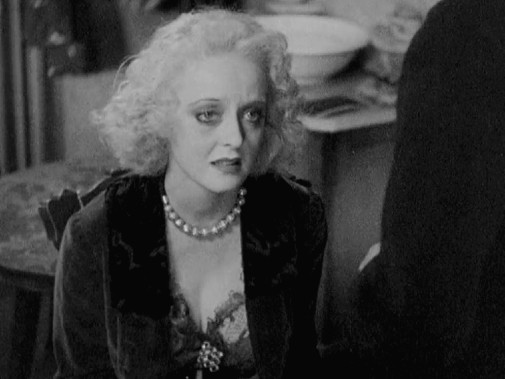
Despite that, it's impossible to look at Mildred Rogers and consider Bette Davis' performance anything short of spectacular. As the toxic love of the narrative unravels, the actress throws everything at the wall in explosions of uncontrollable fury. When Mildred spits insults at Philip, Davis lets her whole body express each venomous word. When she pleads, it's as if someone let all the air out of Mildred, leaving behind a shriveled carcass. No matter what she's doing, Davis gives it her all and it's impossible to tear your eyes away from her. Next to this inchoate being of primordial wrath, Leslie Howard's Philip is eclipsed and his mediocrity made more evident. We grow tired of him, but, no matter how monstrous Bette Davis' Mildred might be, she's a monster that we love watching.
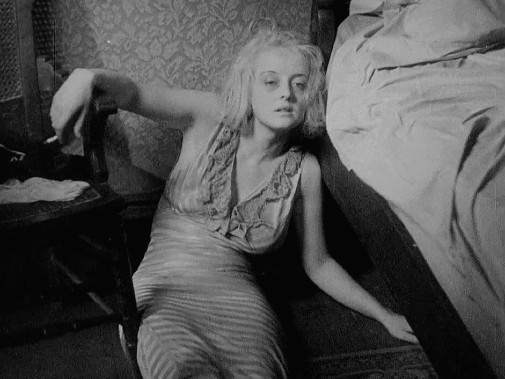
Ladies and gentlemen, this is how a star is born.



Reader Comments (20)
My third favorite davis performance after baby jane and all about in a career full of amazing performances.
a funny and shameful point about my country is that I needed to use vpn to open this post because of the word bondage in it’s link!🤦🏻♂️
Bette Davis got in with the help of the write-in votes, but she did not win. The Academy also allowded these votes in 1935. However, these nominations are not considered to be actual nominatios.This is the list of those who appear in Oscar records. There was only one write-in win.
1934
Best Actress Bette Davis for Of Human Bondage.
1935
Best Actor Paul Muni for Black Fury
Writing G Men.
The film A Midummers Night's Dream got in with Assistant Director and won the Oscar for Cinematography (Hal Mohr)!
The film Captain Blood also got in in three catogories: Director, Screenplay and Scoring.
A quick Google check shows that this master class was released on June 28th, 1934. As always with the Oscars, it’s usually given for them best performance should the month of December). Shocking that Judy could get released in October and still win.
Surprised that the Academy didn’t give her a ‘special achievement award in Make-Up, but if the category existed, it would’ve deservedly gone to an Universal monster movie.
Fantastic write up,did de glam really start here with Bette,always her own creation,She has 11 nominations in my book,write ins were allowed the nomination stands.
I find her wipe my mouth scene to be her most parodied scene but it's her best.
Just your daily (sporadic) reminder that Renée Zellweger is a two-time Academy Award winning Actress.
I'll never understand giving Hepburn four competitive prizes when none of her best moments ever touched anything Davis did on her worst day.
Bette deserved her first Oscar for her Mildred, let alone the nom...
She won the next year for Dangerous which many considered a makeup win. The roles are similar but different- Joyce is an addict who makes bad choices, while Mildred is just bad. Her performance in Dangerous holds up, but to less acclaim because of the scandal around Of Human Bondage.
I don't know. Should this be considered an "almost there", if the Academy not only let it happen (via write-in, yes, but still!) after nominations were announced, but has it listed on their site?
On a semi-related note, a lot of people's annoyences witg performances getting snubbed should be directed to the acting branch and not the AMPAS as a whole, since they're the ones voting on the nominees!
They actually released the runners-up back i will those days:
1st place: Colbert (winner)
2nd place: Shearer
3rd place: Bette!! (write-in)
Colbert was so sure tt Bette is gonna win, she skips the ceremony n is on her way to the train station for a getaway, when she is whisks back to the ceremony to recv the Oscar.
Jack Warner was so outraged/embarassed by the acclaims Bette recv, he used his power to influence the voters NOT to vote for her. He did make it up to her by promoting her actively for Dangerous, a Warner pic! 😂
Speaking o Dangerous, Bette herself thot tt K Hepburn wld win for Alice Adams, n Hepburn was indeed 2nd place according to the votes in 1935 race.
Had Bette won for Of Human Bondage the prev yr, Hepburn wld've won for Alice Adams in 1935, n poor Dame Edith Evans wld've won for The Whisperer in 1967.
Tom G., for having the correct take on Bette's performance in Dangerous and not just going with the sheep opinion of it, Condragulations, you are the winner of this week's challenge.
Claran - can you link me to more of these runners-up stats from the early days if there are more? I've tried before but my googling game is evidently weak. I f these really exist it seems strange that Nathaniel wouldn't have done a piece on it in all these years. Now thathe's much better at delegating it could see the light of day.
@Kim
I saw the stats in a few Bette's bio but i can't rem the actual souce(s).
Based on my memory. The write-in votes for acting only happened twice in 1934 n 1935. Thereafter they changed the rules n expanded the nominees to five, n they dun accept write-in anymore.
I rem the write-in for 1934 are Bette n Myrna Loy for The Thin Man. For 1935, it's only Paul Muni for The Black Fury.
The results o the votes, to the best o my memory, in order o no. of votes rec'v:
1934: Colbert, Shearer, Bette (only 3 actresses mentioned)
1935: Bette, K Hepburn, Berger (the only yr w 6 nominees, but only 3 cited as per prev yr).
The academy did not disclose the actual no o votes each rec'v
I dun recall they mention the tally for Best Actor thot 😂
The votes were
1. Claudette Colbert
2. Norma Shearer
3. Bette Davis
4. Grace Moore
5. Myrna Loy
in 1934.
YEW CAD!
Damn, she's great in this! I do consider her to have 11 nominations. Because I adore Bette.
Best Actress of 1934: Carole Lombard "Twentieth Century"
Fascinating Claran, thanks!
lol @ 3rtful's comment!
Interesting thought from Claran re what might have happened if BD had won for Bondage, but Dame Edith wouldn't have won - she should have - with Bancroft and Dunnaway in contention.
@Joe UK
Dunaway is a newbie, n Bancroft had won not too long ago for The Miracle Worker. Both o them r more well known than Dame Edith n The Whisperer has all but was forgotten by now.
But back in 1967, Dame Edith swept all the major precursor awards in the lead up to Oscars. She won the NYFCC, GG (drama), Bafta, NBR n even Berlin Best Actress. Her performance is actually imo, the most acclaimed among the nominees at tt time.
Edith Evans is magnificent in The Whisperers, but she had a few factors working against her. 1) She wasn't a Hollywood "insider" and even though she'd had two recent nominations they were for British films 2) Unfortunately The Whisperers itself is unwatchable, and I wonder how many Academy members made it all the way to the end of this dreary slog, and 3) She disappears for surprisingly long stretches. Weigh those factors against the fact that K Hepburn was on her 10th (!) nomination and 34 years after her only win combined with being in the most nominated film (tied) and a commercial blockbuster and the result is hardly surpring. My own take is 1. Evans just barely over 2. Bancroft (her best ever) 3. Dunaway well ahead of 4. A. Hepburn and 5. K. Hepburn winning for her least deserving nomination ever, at least until 1981. Oh well, at least it's compensation for 1935, 1942, 1955 and 1962 when she should have won.